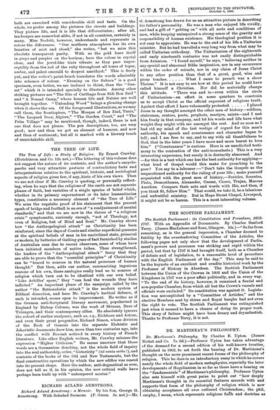THE TREE OF LIFE.
The Tree of Life : a Study of Religion. By Ernest Crawley. (Hutchinson and Co. 12s. net.)—The lettering of this volume does not suggest the nature of its contents, and the author's encyclo- paedic and very attractive pasticcio of contradictory facts and interpretations relative to the spiritual, historic, and sociological aspects of religion gives few, if any, hints of his own views. Then we are not clear if Mr. Crawley is quoting, or personally reflect- ing, when he says that the religions of the earth are not separate phases of faith, but varieties of a single species of belief which, whether in its primary supernatural or its later humanitarian types, constitutes a necessary element of "the Tree of Life." We miss the requisite proof of his statement that the present epoch of bridge and football is an era of "a readjustment of mental standards," and that we are now in the throes of "a religious crisis" symptomatic, curiously enough, "not of Theology, not even of Religion, but of Mind and Soul." Mr. Crawley shows how "the Anthropological attack" on Christianity has been reinforced, since the days of Comte and similar superficial guessers at the spiritual beliefs of man in his uncivilised state, primeval or modern, by batteries of Gatling guns of fact furnished by studies of Australian man due to recent observers, some of whom have been initiated members of native tribes. Thus strengthened, the leaders of the "Anthropological attack" fancy that they are able to prove that the "essential principles" of Christianity can be "traced to sources in the natural processes of human thought." But then, adds our author, summarising ingenious reasons of his own, these analogies really lead us to sources of religion which turn out to be identical with our own belief. "Like Achilles' spear," they "can heal the wounds they have inflicted." An important phase of the campaign called by the author "the Rationalistic attack" is the modern system of Biblical dissection, and here Mr. Crawley's tactical defence, if such is intended, seems open to improvement. He writes as if the German anti-Scriptural literary movement, popularised in England by Bishop Colenso, was the work of Strauss, Baur of Tubingen, and their contemporary allies. He absolutely ignores the cohort of earlier analysers, such as, e.g, Eichhorn and Astruc, and even their great progenitor, Richard Simon, whose division of the Book of Genesis into the separate Elohistic and Jehovistic documents drew him, more than two centuries ago, into the conflict with Bossuet noticed in every history of French literature. Like other English writers, Mr. Crawley misuses the expression "Higher Criticism." He seems unaware that those words are a Germanism denoting, not the whole field of inquiry into the real authorship, order," historicity" (sit venia verbs !), and contents of the books of the Old and New Testaments, but the final constructive operations by which the new edifice was reared into its present shape. Here the author, anti-dogmatical as ever, does not tell us if, in his opinion, the new critical walls have perhaps been built up with " untempered mortar."






























































 Previous page
Previous page